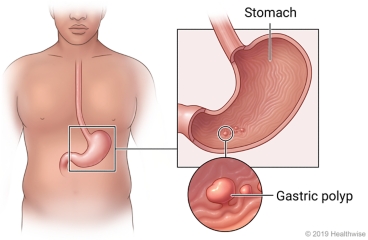Learning About Gastric Polyps
What are gastric polyps?

Gastric polyps are growths in the stomach. Most people who get them don't have any problems.
The cause of most gastric polyps is not known. But some polyps grow in people who use stomach acid reducers
called proton pump inhibitors (PPIs). People who have gastritis, ulcers, or an H. pylori bacterial
infection in the stomach can sometimes get polyps. People who have a parent or sibling with gastric polyps
might have them too.
Most gastric polyps aren't cancer. But a certain kind of polyp can turn into cancer.
What are the symptoms?
You may not know that you have gastric polyps. Most polyps don't lead to symptoms. Once in a while, larger
polyps may cause bleeding, belly pain, or a blockage in the stomach.
How are polyps diagnosed and treated?
Most gastric polyps are found during an endoscopy (say "en-DAW-skuh-pee") that is done for another health
problem. Endoscopy is a test that uses a thin flexible tube to allow a doctor to look at the inside of your
stomach.
Your doctor will treat your polyps based on what is seen during this test. If your doctor finds a polyp
during the test, they may take it out. It will then be tested to make sure it isn't cancer.
If your doctor finds H. pylori bacteria in your stomach, the doctor will prescribe antibiotics. If you
have been taking a PPI, the doctor may prescribe a different medicine instead.
Sometimes the doctor may suggest another endoscopy to see how treatment is working. They may also suggest
this to recheck certain kinds of polyps. The doctor may also suggest a colonoscopy to look for polyps in your
colon.
Follow-up care is a key part of your treatment and safety. Be sure to make and go to all
appointments, and call your doctor if you are having problems. It's also a good idea to know your test results
and keep a list of the medicines you take.
Current as of: October 19, 2023
Content Version: 14.0
Care instructions adapted under license by your
healthcare professional. If you have questions about a medical condition or this instruction, always ask
your healthcare professional. Healthwise, Incorporated disclaims any warranty or liability for your use of
this information.